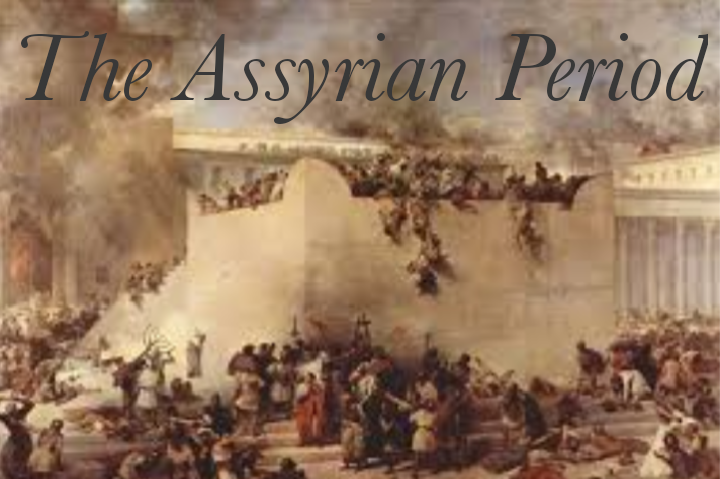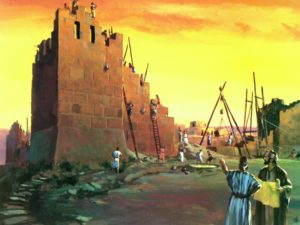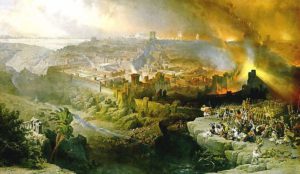This lesson continues the story of Israel, but takes a turn for the worse. Eve is promised a Seed to conquer the enemy (Satan) and Abraham a Land, Nation, Name, and Blessing. During Solomon’s reign, the fruits of these promises are blooming. The Son of David is even sitting on his throne as God promised. However, Lesson 9 revealed that Israel’s kings ultimately fail to uphold the covenant of God with Israel and through Moses. Assyria looms large on the horizon, and it is only a matter of time before this ferocious enemy introduces Israel to her maker.
Introducing the Assyrian Period
The Assyrian Period in biblical history officially begins in 1 Kings 17:6 where it is documented, “The king of Assyria took Samaria and carried Israel away to Assyria.” This occurs in the year 722 B.C. While this event effectively ends the history of the 10 northern tribes of Israel within the Old Testament, the 2 southern tribes of Judah live on and can be found in the remainder of Old Testament historical writings (2 Kings 18-23 & 2 Chronicles 30-35). But don’t forget about the prophets! Yes, several prophets preach and write during the years leading up to and during the Assyrian Period of captivity. Here is a visual-
Before 722 B.C.– Jonah, Amos, and Hosea
Before & After 722 B.C.– Micah and Isaiah
After 722 B.C.– Nahum and Zephaniah
Each prophet must be read in relation to when he lived and preached. We can learn a lot about the Assyrian Period by reading these prophets; mostly we learn how that God is using the nation of Assyria to judge Israel for her covenant infidelity. In order to better understand the story of Israel and their Assyrian captors, let us break the plot down into its main parts, focusing mainly on the prophets above for spicy details.
Assyria the Animal– God is spoken of as an angry lion in Amos 3:8. This describes His demeanor when He pours out His judgment on Israel by the hand of Assyria. The surrounding verses support this conclusion. This visual of a lion is also a fitting description of Assyrian rage. This empire is known in history as being perhaps the most domineering and ruthless of world conquistadors. This quote from the empire’s third king illustrates their brutality:
I built a pillar over against his gate, and I flayed all the chief men … and I covered the pillar with their skins … some I impaled upon the pillar on stakes. Many captives … I burned with fire … From some I cut off their hands and their fingers, and from others I cut off their noses, their ears … of many I put out the eyes. (Ancient Origins)
God does not play games. Certainly, there was no animal more feared than Assyria, and it was by this beast that God would make His sovereignty known to Israel.
Israel the Whore– Hosea graphically indicts Israel as a whoring wife who has slept around on her covenant husband. Unfortunately for Hosea, God makes him experience this firsthand so that he can sympathize with God whose covenant wife has cheated on Him. It does not take Hosea long to sympathize, emboldening his message toward Israel. Israel has become drunk with harlotry, fornicating with wooden idols (Hosea 4:11-12). She is a repulsive cow who crushes the poor and needy (Amos 4:1). She lies around fattening her belly, fanning her face, frolicking in music and wine (Amos 6:3-6).
God the Terminator– God is ever merciful, but he is no push-over. For all the gross sins of Israel, God will terminate them quite literally. He will strip her naked and slay her with thirst (Hosea 2:3). He will make her a forest for beasts of the field to come and devour (Hosea 2:12). His wrath will be poured out on them like water (Hosea 5:10). The slaughter will be so great that everyone in a given house will be murdered and their own loved ones will have to drag their bodies out to be burned (Amos 6:9-10). This is the poetic, yet near literal way to describe the judgment of God by his terminating instrument- the Assyrian army.
What You Need to Know– The take away from all this should sink in easily. While Israel experienced a passing taste of God’s promises to Eve, Abraham, Isaac, Jacob, Judah, and David, these promises were merely conditional and typical. The conditional reality of these promises cannot be more clear than in the language of Hosea and Amos. It was because of their failure to keep the covenant that God brought judgement: the very thing God promised would happen as far back as Moses (Lev. 26:14-39; Deut. 28:15-68). The typical feature of these promises is enjoyed once you get to the New Testament. Hosea is one of the first passages in reference within the gospel of Matthew (2:15). Hosea even says that after all these things (captivity and judgment), “The number of the children of Israel shall be as the sand of the sea; which cannot be measured or numbered. And it shall come to pass in the place where it was said to them, ‘You are not My people,’ there it shall be said to them, ‘You are sons of the living God.'” (1:10) This very prophecy is directly alluded to in 1 Peter 2:9-10 and applied to the church. Here we see the ultimate focus of the patriarchal promises. However, with all that said, do not forget what happened to Israel. The promise is conditional. Though God is gracious enough to save His people from their sins, we can still play the harlot with our own fanciful idols. God is a lion and, “The Lord roars from Zion,” (Amos 1:2). Do not take His promises lightly.
Conclusion– This lesson sums up the total of the Assyrian Period rather unjustly. All that happens in the next period of history is really more of the same, but with slightly different characters. Come back next week as we discover the Babylonian Period in five minutes!
Helpful Resources- 1) An Old Testament Theology by Bruce Waltke 2) Ancient Origins- http://www.ancient-origins.net/ancient-places-asia/powerful-assyrians-rulers-empires-006792



